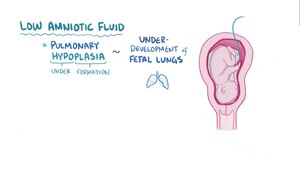Potter sequence
| Potter sequence | |
|---|---|
| Synonyms | Potter's syndrome, Potter's sequence, oligohydramnios sequence |
| video explanation | |
| Classification and external resources | |
| Specialty | medical genetics |
| ICD-10 | Q60.6 |
| ICD-9-CM | 753.0, 658.0, 761.2 (for oligohydramnios) |
| DiseasesDB | 11252 |
| MedlinePlus | 001268 |
| eMedicine | ped/1878 |
| Patient UK | Potter sequence |
Potter sequence is the atypical physical appearance of a baby due to oligohydramnios experienced when in the uterus. Oligohydramnios is the decrease in amniotic fluid volume sufficient to cause deformations in morphogenesis of the fetus.
Oligohydramnios is the cause of Potter sequence but there are many things that can lead to oligohydramnios. It can be caused by renal diseases such as bilateral renal agenesis (BRA), atresia of the ureter or urethra causing obstruction of the urinary tract, polycystic or multicystic kidney diseases, renal hypoplasia, amniotic rupture, toxemia, or uteroplacental insufficiency from maternal hypertension.
Potter's sequence is known in the medical field as clubbed feet, pulmonary hypoplasia and cranial anomalies related to the oligohydramnios.
The term Potter sequence was initially intended to only refer to cases caused by BRA; however, it is now commonly used by many clinicians and researchers to refer to any case that presents with oligohydramnios or anhydramnios regardless of the source of the loss of amniotic fluid.
The failure of the metanephros to develop in cases of BRA and some cases involving unilateral renal agenesis (URA) is due primarily to the failure of the mesonephric duct to produce a ureteric bud capable of inducing the metanephric mesenchyme. The failed induction will thereby cause the subsequent degeneration of the metanephros by apoptosis and other mechanisms. The mesonephric duct(s) of the agenic kidney(s) will also degenerates and fail to connect with the bladder. Therefore, the means by which the fetus produces urine and transports it to the bladder for excretion into the amniotic sac has been severely compromised (in the cases of URA), or completely eliminated (in the cases of BRA). The decreased volume of amniotic fluid causes the growing fetus to become compressed by the mother's uterus. This compression can cause many physical deformities of the fetus, most common of which is Potter facies. Lower extremity anomalies are frequent in these cases, which often presents with clubbed feet and/or bowing of the legs. Sirenomelia, or "Mermaid syndrome" (which occurs approximately in 1:45,000 births) can also present. In fact, nearly all reported cases of sirenomelia also be present with BRA.
...
Wikipedia

